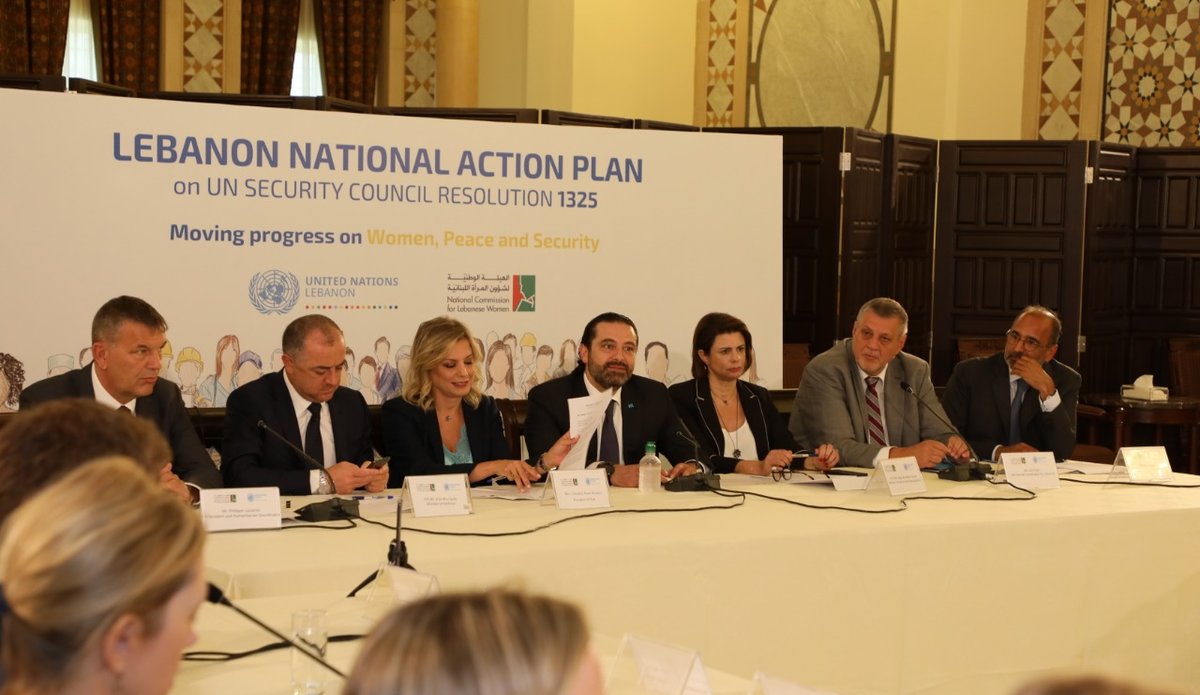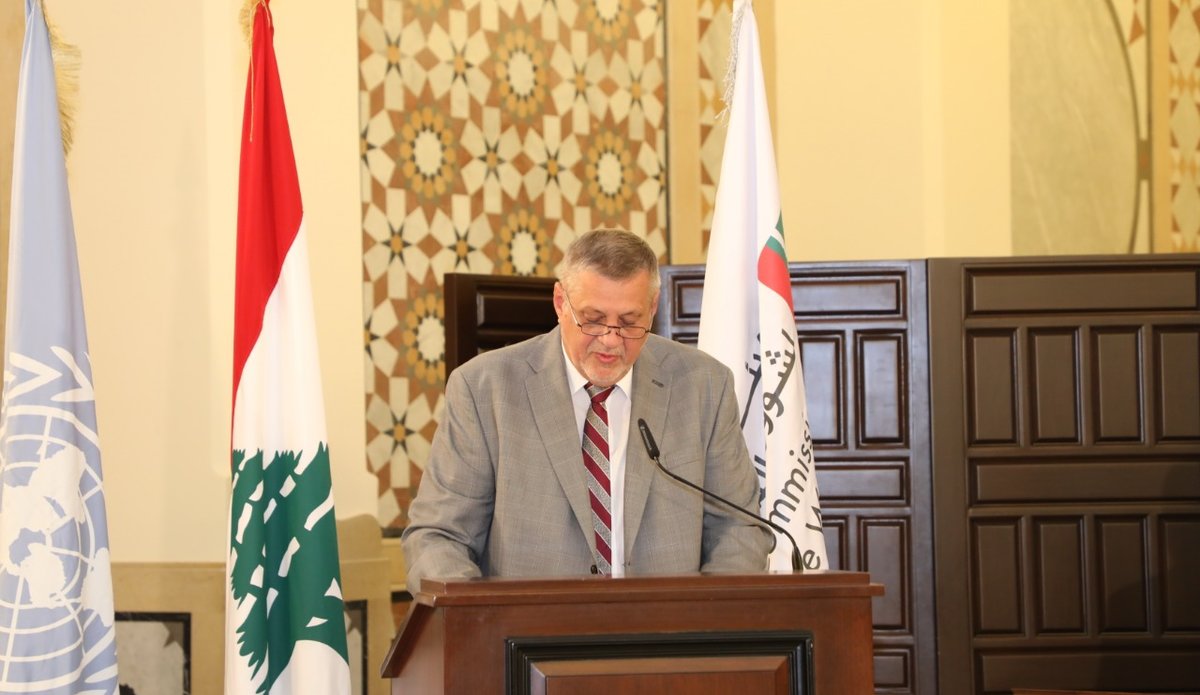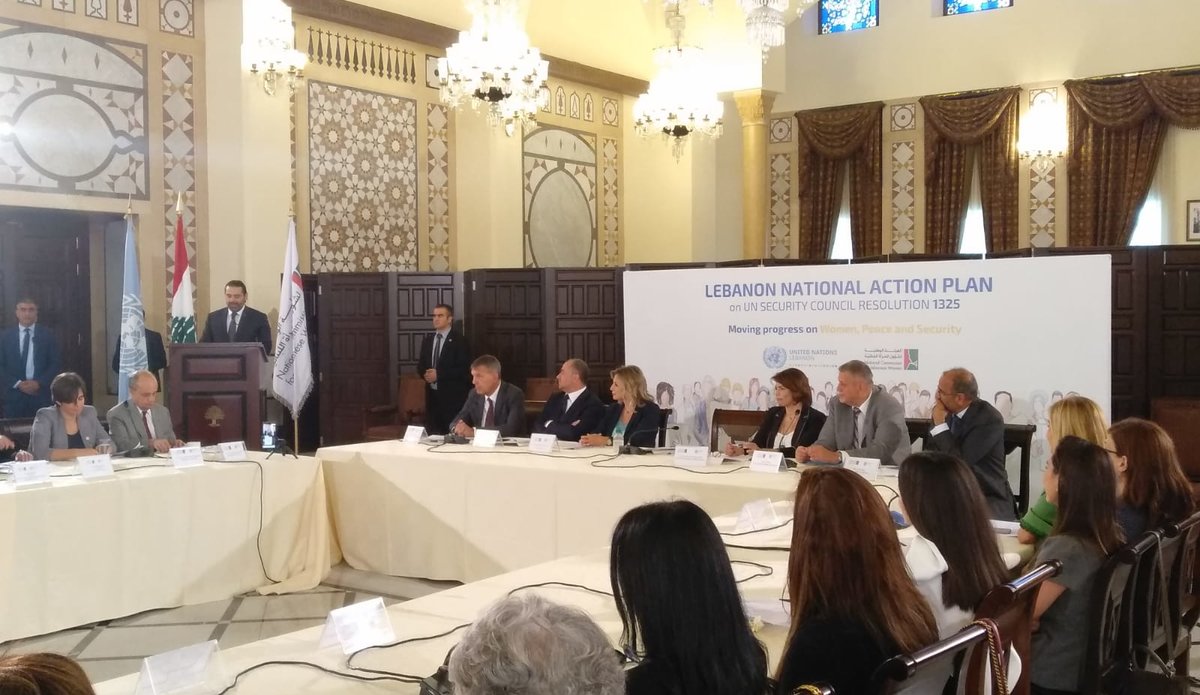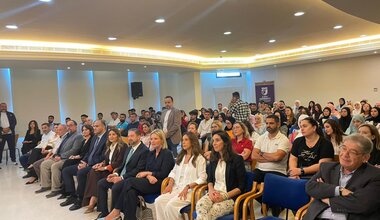NCLW Presents National Action Plan on Resolution 1325 on Women, Peace and Security
A roundtable was held today at the Grand Serail, under the patronage of the President of the Council of ministers Saad Hariri, to present the National Action Plan (NAP) on UN Security Council Resolution 1325 on Women, Peace and Security.
The meeting was organized by the National Commission for Lebanese Women (NCLW) and was attended by Ministers Raya el Hassan and Elias Abousaab, the president of NCLW Mrs Claudine Aoun-Roukoz, the UN Special Coordinator for Lebanon Jan Kubis, the UN Resident and Humanitarian Coordinator for Lebanon Philippe Lazzarini, UNIFIL Deputy Head of Mission and Director of Political and Civil Affairs Imran Riza, and a number of representatives of national institutions, the United Nations and the international donor community.
Hariri
Prime minister Hariri delivered the following speech:
"Good morning and thank you all for being here today.
In 2017, my government entrusted the National Commission for Lebanese Women with the task of developing a National Action Plan on UN Security Council 1325.
I agreed with Mrs. Claudine Roukoz on the need to have this roundtable at the Grand Serail to reaffirm my personal and my government’s commitment to the National Action Plan.
I look forward to having this endorsed by the Council of Ministers at the earliest occasion.
I cannot stress enough the value I attach to the importance of this landmark resolution on women, peace and security. As we run up to celebrate the 20th anniversary of this resolution in 2020, I want to reiterate my commitment made at the Rome II Conference, to recruiting more female officers and to ensuring increased representation of women at all decision making levels in institutions and mechanisms for the prevention, management and resolution of conflicts.
By the way, I am very inspired by (Canadian) Prime minister (Justin) Trudeau's recent appointment of a Special envoy for women, peace and security, as Sweden has done as well. These are countries leading by example. I hope we and others will follow.
More women in Lebanon’s security institutions means stronger institutions. And stronger state institutions will strengthen the rule of law. This is a priority for me.
My appointment of Raya al Hassan as Minister of Interior, a first in the Arab World, is a clear testimony of my full commitment to this resolution, not only in words, but in deeds.
I am asking you all present here today to continue working with the Government of Lebanon and support our efforts in this field.
This is one of the most important agendas for me as a Prime minister, because it will be fruitful for the country, good for peace and will enable our political differences to be managed in a better way. When we really believe in something, we should push it. I encourage women in Lebanon to do what Raya and Claudine are doing today because we need to hear your voices. I am ready to work with every person who has an agenda on advancing the role of women in all institutions, I will be the spearhead in this issue and I am ready to do everything that is required from me."
Roukoz
Mrs Aoun Roukoz gave the following speech: “It is a great honor to be standing here, after two years of dedicated work, to share with you Lebanon’s first National Action Plan for the implementation of the United Nations’ Security Council resolution 1325, on Women, Peace, and Security.
Towards the end of 2017, the Presidency of the Council of Ministers entrusted NCLW, the National Commission for Lebanese Women, with the important yet challenging task of developing a national action plan on 1325. Since then, we devotedly embraced our new mission because we knew that this first NAP would be a huge step towards achieving sustainable peace and gender equality in our country.
With the support of United Nations agencies, NCLW did not spare any effort in achieving its new mission. The process of developing the NAP was long and challenging yet fulfilling and rewarding in terms of lessons learned and goals achieved.
Today, we can proudly say that Lebanon’s NAP on 1325 is the fruitful outcome of close collaborative work between governmental institutions and civil society organizations. The participatory and inclusive approach in devising the NAP was reflected in all the steps of the process including in reaching consensus on strategic priorities and interventions, in developing a monitoring and evaluation framework necessary to assess the progress of the NAP, and finally in its costing and budgeting.
As such, NCLW formed and chaired a 1325 steering committee, with government and civil society representatives on board, which was tasked with developing a 1325 NAP that is inclusive and addresses Lebanon’s priorities. NCLW held several rounds of consultations with key stakeholders at the local and national levels to develop measurable interventions in accordance with the strategic priorities of our NAP.
The involvement and engagement of all relevant partners, throughout the development process of the NAP, increased national ownership for the plan along with the commitment of both government and civil society for its full implementation. Accordingly, some governmental entities have already proceeded with the implementation of activities within their scope of work, even before the final governmental endorsement of the plan.
The proposed 1325 NAP for Lebanon includes five strategic priorities that were defined and agreed upon as follows:
1- Increase the participation of women in decision-making at all levels: in security and defense sectors, in political and public life; in the economy as well as in peace mediations and negotiations;
2- Engage women in conflict prevention including raising awareness on human rights and tolerance;
3- Prevent and protect women and girls from sexual and gender-based violence including strengthening coordination mechanisms between different national institutions to respond effectively to gender-based violence;
4- Integrate women’s needs and perspectives in all relief and recovery efforts;
And last but not least:
5- Amend, adopt and implement laws and policies that will serve to advance the above priorities.
Today, we are looking forward to the endorsement of our NAP by the Council of Ministers. Thanks to the support of the President of the Lebanese Republic, General Michel Aoun, and the strong commitment of Prime Minister Saad Hariri, we are confident that this step will be successfully achieved within the coming few weeks.
However, and in light of the financial crisis that our country is facing, the main challenge for the successful implementation of the 1325 NAP is financing interventions across the five strategic priorities.
Past experiences have shown that the political will of governments remains insufficient for the proper implementation of any national action plan in the absence of financial provisions. Governments will struggle and eventually fail in their mission of fulfilling their commitment if no funds are secured for this purpose.
NCLW seeks to provide this 1325 NAP with optimal chances of success because our mission goes beyond developing and drafting a national action plan. Our mission is also to ensure its timely and effective implementation to support conflict prevention efforts and contribute to Lebanon’s overall security and stability.
For this purpose, NCLW led once again a highly participatory process for costing the 1325 NAP. By doing so, we were not only helping the government form a comprehensive picture of its future financial commitments, but also encouraging the international community to financially support activities that fall within their mandate and strategic plans to assist Lebanon.
Today’s challenge is to secure the needed funds for the implementation of the 1325 NAP. Our hopes are high, especially in view of the clear solid determination of the international community to support this strategic endeavor as thoroughly expressed to us in bilateral meetings and discussions.
We all dream of a peaceful and stable Lebanon where peace and security are strengthened by women’s increased engagement in politics, in security and defense sectors as well as in mediation, and peace negotiations.
We all dream of a gender-equal society where women and men enjoy perfectly equal rights and benefit from equal opportunities.
This four-year NAP will surely pave the way towards our well-defined goals of sustainable peace and gender equality.
Before giving the floor to our Prime minister, His Excellency, Mr. Saad El Hariri, I would like to thank him for his unconditional support and his total belief in the crucial role of women’s engagement in advancing sustainable peace and development for our country.
Our gratitude goes also to all ministers whom, by their presence or one of their representatives, reiterate their commitment towards the Women, Peace and Security Agenda.
Allow me also to extend our deepest gratitude to all of you excellencies, ambassadors and friends of Lebanon, who have reiterated on many occasions the willingness of your respective countries to assist Lebanon in its numerous endeavors, and who have taken time off their busy schedules, to join us today and learn more about our 1325 NAP.
Finally, I personally and on behalf of NCLW would like to thank all our partner UN agencies for their constant valuable assistance in supporting Lebanon and in helping us design, draft and implement our first 1325 national action plan”.
Kubis
Kubis delivered the following speech: “I would like to congratulate the National Commission for Lebanese Women, under the leadership of Ms. Aoun-Roukoz, for their tremendous work and dedication in the development of this country’s first draft National Action Plan on Women, Peace and Security.
I would also like to recognize the commitment of the Government of Lebanon, under the leadership of His Excellency Prime Minister Saad Hariri, to peace, security and development in Lebanon, and to gender equality, women’s empowerment and representation in decision-making.
I welcome the Government’s intentions and initial efforts to revitalize its economy and put it on a sustainable path through structural reforms. Working in a spirit of shared responsibility and compromise has resulted in first steps on several Government priorities. The early adoption and implementation of this National Action Plan would be another important step towards stability, the extension of state authority, good governance, the rule of law, women’s empowerment, inclusiveness, and gender equality. It will strengthen protection, accelerate economic recovery and lead to more sustainable peace and development.
The draft National Action Plan is a result of a consultative process that engaged broad segments of Lebanese society on their concerns and priorities for peace and security; and that reflects the country’s collective aspirations, both of women and men. It is a symbol of the importance of women’s voices, priorities and capacities in peacebuilding efforts.
The draft Plan on Women, Peace and Security introduces numerous practical measures and tools. In some parts, its implementation has begun, thanks to the Government of Lebanon, the Government of Finland and the Rebecca Dykes Foundation. In this regard, I would like to acknowledge the efforts by the Ministries of Interior and Municipalities, and of Defense. For example, at the Rome II conference in March 2018, as part of the Capability Development Plan, they pledged to increase the participation of women in all levels of decision-making and have since made substantive progress. Many thanks to both ministers present here for their strong leadership.
It is critical that the National Plan is time bound, costed and implemented in a coordinated manner and that the Government of Lebanon allocates adequate funds and resources to that plan. Similar support from Lebanon’s international partners is equally essential.
Thus we all too must invest in this plan. Here I would like to thank the Resident Coordinator, Mr. Philippe Lazzarini, and the UN Women for ensuring UN support to the development of the plan. I also thank all other UN partners involved, for their commitment and vision.
Today’s event comes at a timely moment, when Lebanon has launched a multisectoral reform process, when more than ever the country needs all the tools and capacities to pursue a path of peace, security, and stability in a truly inclusive way”.
Lazzarini
Lazzarini gave the following speech:
“It is my privilege to be here with you today to discuss the way forward for Lebanon’s draft National Action Plan on UN Security Resolution on Women, Peace and Security.
Like my colleagues, I would first like to congratulate the National Commission for Lebanese Women, led by Ms. Aoun-Roukoz, for her leadership in developing this draft National Action Plan. I would also like to commend the Government of Lebanon, and His Excellency Prime Minister Hariri for his leadership in promoting this important agenda for Lebanon.
Adopted in the year 2000, UN Security Council resolution 1325 recognized the unique impact of conflict on women, and their under valued contributions in peace, security and recovery.
Globally, the Women, Peace and Security agenda has been gaining visibility as policy makers, activists and women’s organizations look at it as a key tool for 1) national stability, for 2) guiding foreign policy, and 3) in shoring up gender equality.
Today, 79 countries have adopted such plans, and I hope that Lebanon will be number 80.
There is today overwhelming evidence that gender equality and women’s empowerment are closely linked to stability and peacefulness. Data has showed that when women are more empowered, the state is less likely to experience conflict. They also show that women participation increases the probability of a political agreement- lasting at least two years- by 20%. Finally, we also know that police and security forces are more likely to be ‘accepted’ if they are representative and that women are more likely to have their security needs responded to if women are among security forces.
It means that, by building equality not only we give women a chance to fulfil their potential, but we also build more stable and developed society.
With regard to Lebanon, the National Action Plan reflects the aspirations and hope of the Lebanese people, who have engaged in its development to identify national priorities for peace and security. The focus of the National Action Plan is to increase women’s participation across a range of domains. This includes decision-making at the political and public life level, in the economy, and the security sector level, including the participation in peace negotiations and mediation.
These priorities are even more important to be urgently addressed, noting that Lebanon poorly ranks 140 out of 149 in Global Gender Gap Report published in 2018 by the World Economic Forum - – ahead of only Saudi Arabia, Iran, Syria, Iraq and Yemen in the region.
The mere existence of a National Action Plan does not guarantee its implementation. Political will over its implementation is the first key step, and hopefully we will hear soon about the plan endorsement by the council of ministers. Once approved, the next challenge will be its implementation which will require human resources capacity, budget allocation and monitoring frameworks. While the Government has already allocated USD 1.4 million, the full implementation of the National Action Plan requires nearly USD 19 million. Without these resources, many action in the plans will be left unactionable.
The good news, however is that Lebanon’s plan is already recognized as a best practice. Allow me here to further elaborate on some of the reasons behind: First, the plan was drafted in an inclusive way. Six national consultations were carried out involving a wide range of government actors, the security sector, civil society organizations and women’s voices. Second, the plan lays out a focused timeline around key priorities and it pays careful attention to monitoring, training, and costing. Third, the plan links closely to existing plans such as the National Strategy for Women in Lebanon, the National Action Plan for Human Rights, the National Strategy to Prevent Violent Extremis and the Strategy to Combat Violence against Women and Girls. These links aim at leveraging and catalyzing action on peace and security, and women’s rights. And finally, the Government has made a financial commitment to the plan as underlined in the remarks of the Special Coordinator.
I am also pleased to share with you that the UN is finalizing a joint programme on women, peace and security to support the Government of Lebanon with the implementation of the National Action Plan over the next four years. The initiative is a partnership between National Commission for Lebanese Women, UN Women, UNESCWA, Office of High Commissioner of Human Rights, UNDP, UNFPA and UNIFIL. The UN support will focus on providing technical assistance including monitoring, reporting and evaluation capacity as well as on supporting resource mobilization for national institution and civil society organization implementing the National Action Plan.
The draft National Action Plan offers Lebanon an important framework for advancing gender equality and contributing to the shoring up Lebanon’s security. In articulating its vision for peace and security in Lebanon, it is both ambitious and realistic. Ambitious in striving for women’s equal representation in decision making, and realistic in understanding the very real challenges that Lebanon faces, and how women can meaningfully contribute to addressing these.
We know that change takes time. With Lebanon’s commitment to empowering women, we have a partner invested in driving change with us.
Thank you for your partnership and I look forward to continuing to work with all of you on this important agenda that unites us for peace, equality and inclusion”.
Riza
Riza pronounced the following speech:
“I would like to congratulate Lebanon and the National Commission for Lebanese Women on the preparation of Lebanon’s first National Action Plan to Implement UNSCR 1325. When it is adopted, the Plan will put Lebanon among the first countries of the MENA Region with a national framework to advance the Women, Peace and Security agenda.
As a UN peacekeeping mission, UNIFIL places the Women, Peace and Security agenda among the main features of its work in Southern Lebanon, where gender considerations and the specific security needs of women and girls are integrated at the strategic, tactical and operational levels.
In line with the objectives of the United Nations, the Mission develops activities in support of the empowerment of women and girls and conducts contingency plans for their protection.
I am pleased to report that, like in Lebanon, UNIFIL’s attention to issues on the Women Peace and Security agenda is only growing. This, allow me to highlight, is also at the specific request of the Members of the Security Council which last August for the first time unanimously demanded in Resolution 2433 that:
UNIFIL take fully into account gender considerations as a cross-cutting issue and assist the Lebanese authorities in ensuring the full and effective participation, involvement and representation of women at all levels of decision-making.
The Security Council further requested enhanced reporting by UNIFIL to the Security Council on this issue.
Ladies and gentlemen, I am here to assure you that UNIFIL takes this new specific mandate from the Security Council very much to heart. The Mission is committed to working hand in hand with the Lebanese authorities on the ground in the South in implementation of these common objectives.
Since 2014, UNIFIL hosts annual Gender Working Groups to raise awareness on issues of Women, Peace and Security, and to bring forth the views and perspectives of women of Southern Lebanon in the areas covered by Resolution 1325: prevention of harm, protection from harm, increased effective women’s participation, and engendering post-conflict relief and recovery efforts. Together with prominent women of the communities in the South, we have also explored women’s participation in municipal politics, in national politics, women’s economic empowerment in post-conflict societies; and just this April, the forum addressed the importance of women’s economic empowerment for their effective political participation.
It is our great satisfaction that the National Action Plan has included and responded to the views expressed by the women of Southern Lebanon.
In accordance with peacekeeping requirements, UNIFIL allocates a minimum of 15 percent of its Quick Impact Projects’ budget to projects that are focused on building the capacity of women in order to ensure their effective participation, involvement and representation at all levels of decision-making. An ongoing project on training women mediators in Southern Lebanon - conducted in coordination with UN Women - is benefiting from this funding. Once trained, participants will join a network of women mediators in the region to make their skills available for conflict management in other settings.
Next year, 2020, will be a strategic year for women, peace and security issues as we will be marking a number of anniversaries:
- the 20th anniversary of UNSCR 1325,
- the 25th Anniversary of the Beijing Declaration and Platform for Action,
- the 5th Anniversary of the Sustainable Development Goals and Paris Climate Agreement, and
- the 75th Anniversary of the United Nations.
Let us use these milestones to amplify the momentum in favor of the women, peace and security agenda and improve the lives of women through participation, justice, and peace. Beyond these global milestones, let us continue to focus in our daily work on the messages, acts and policies which can bring us closer to the goal of gender equality.
Within its means and area of deployment, UNIFIL is ready to work with you in support of the National Action Plan and our common objectives. We are ready to support you in the South and we look forward to our future achievements”.
The Plan
The NAP 1325, when passed, commits Lebanon to engaging women in political dialogues and in peacebuilding efforts, to increasing women’s representation in the security forces, to ensuring that women affected by crisis in Lebanon have their basic needs met, and to driving through legislative change that enhances women’s protection and rights.
At the request of the Presidency of the Council of Ministers in 2017, the NAP development process has been led by the NCLW with support from UN Women, ESCWA, OHCHR, UNDP, UNFPA, and UNIFIL through a UN joint initiative, for which UN Women serves as General Secretariat. It was developed through nation-wide consultations and includes a costed and time bound framework for action.
The Steering Committee for the development of the NAP, headed by NCLW, consists of the ministries of defense, interior, foreign affairs, justice, social affairs and women’s affairs (which was since replaced by the Office of the Minister of State for the Economic Empowerment of Women and Youth) and three civil society organizations working on issues of political participation and gender-based violence in addition to an academic institution.
The Lebanon NAP 1325 is a four-year costed plan with a total budget of USD 15,069,616, which includes a ten percent contribution from the Government of Lebanon throughout the NAP’s life cycle. The NAP 1325 is a key element in Lebanon’s peace and security architecture and provides a framework for a fairer and more inclusive Lebanon.
 UN
UN









